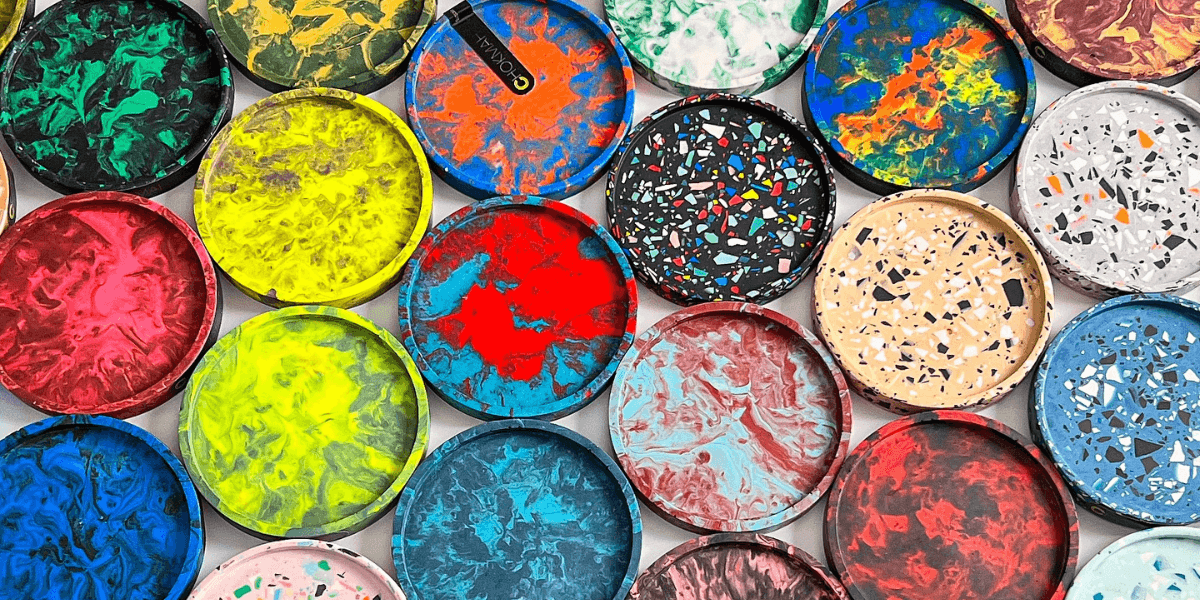
What Is Jesmonite? Eco-Friendly, Versatile & Perfect for Artists: AC100 vs. AC730 Explained

Jesmonite has become a go-to material for artists, designers, and eco-conscious makers looking for sustainable, versatile, and durable materials. As more people lean toward eco-friendly lifestyles, Jesmonite UAE is gaining popularity for creative projects big and small.
But what exactly is Jesmonite? Is it truly environmentally friendly? And what’s the difference between AC100 and AC730?
Let’s dive in and explore why Jesmonite is such a powerful material for artists and designers in the UAE and beyond.
What Is Jesmonite?
Jesmonite is a composite material developed in the UK around 50 years ago. It’s made by combining gypsum powder with a water-based acrylic resin. Originally created for the construction industry, Jesmonite is now widely used in art, sculpture, interior décor, and architecture due to its safety and creative potential.
Creating with Jesmonite UAE

Jesmonite opens the door to limitless creativity. From smooth trays and terrazzo coasters to architectural elements and garden sculptures — artists and makers are using it to bring modern, sustainable design to life.
At Resin Art Hub, we’ve seen Jesmonite become a favorite among UAE-based artists and workshop participants. It’s especially loved for its easy mixing, matte finish, and ability to mimic natural materials.
Benefits of Jesmonite: Why Artists & Designers Love It

Whether you’re a professional artist, a designer, or a DIY enthusiast, crafting with Jesmonite comes with several advantages that make it an attractive option.
✨ Aesthetic Charm
Jesmonite gives your work a high-end, natural look — think stone, ceramic, or terrazzo — with a handmade feel.
💪 Durable but Lightweight
It’s strong enough for daily use, yet light enough for indoor items like trays, bowls, or bookends.
🎨 Texture Flexibility
Jesmonite can replicate surfaces like wood, metal, fabric, leather, or stone, making it ideal for both minimal and bold styles.
🌱 Safer to Use
Jesmonite is non-toxic and water-based, meaning no harmful fumes or harsh chemicals. Great for home crafters!
🌍 Sustainable Choice
While it includes acrylic, the base material — gypsum — is low-energy and naturally sourced. Jesmonite’s durability also means less waste over time, especially compared to plastic or traditional resin.
If you're looking to create eco-conscious decor in the UAE, Jesmonite is a smart and stylish option.
For those looking to craft sustainable, unique home decor items like trays, coasters, or even terrazzo-style surfaces, Jesmonite is an excellent choice. It offers a premium finish without the environmental downsides of other materials like plastic or resin.
Is Jesmonite Eco-Friendly?

Yes! Jesmonite is widely known for being eco-friendly. It contains gypsum, a natural mineral that requires very little energy to process. Its low-VOC formulation and long product lifespan reduce its environmental impact — ideal for artists who care about sustainability.
Even with a small amount of acrylic resin, the environmental footprint remains minimal compared to synthetic materials.
Jesmonite AC100 vs AC730: What's the Difference?
 image: woodberg.net
image: woodberg.net
If you're shopping for Jesmonite in the UAE, you’ll likely come across AC100 and AC730. Both are great, but serve different purposes:
🧪 Jesmonite AC100
- Fast-setting – Great for small, detailed molds
- Lightweight – Ideal for coasters, trays, and vases
- Textured versatility – Can imitate stone, wood, or ceramic
- Indoor use – Not ideal for permanent outdoor exposure
Perfect for craft lovers and hobbyists who enjoy Jesmonite home decor or functional art.
🧱 Jesmonite AC730
- Built for outdoors – UV- and weather-resistant
- Heavier and tougher – Used in large-scale or structural pieces
- Natural finish – Produces a stone-like look with added durability
AC730 is often chosen by architects or sculptors working on outdoor pieces in the UAE climate.
Summary
| Feature | Jesmonite AC100 | Jesmonite AC730 |
|---|---|---|
| Set Time | Quick | Slower |
| Best For | Indoor decor, small items | Outdoor sculptures, large projects |
| Weight | Lightweight | Heavy-duty |
| Texture | Wide range (wood, stone, etc.) | Stone-like finishes only |
| Weatherproof | ❌ Not suitable for outdoors | ✅ Excellent for outdoor use |
Want to Try Jesmonite In the UAE?
We stock a full range of Jesmonite UAE products, including AC100, AC730, terrazzo flakes, pigments, sealers, and silicone molds. Whether you’re just getting started or looking to experiment with new designs, we’ve got you covered.
Better yet — join our Jesmonite workshop in Dubai to learn hands-on techniques, color mixing tips, and how to achieve perfect terrazzo or marble finishes.
FAQ'S
What is Jesmonite?
Jesmonite is a composite material made from gypsum powder and water-based acrylic resin. It is versatile, durable, and eco-friendly, commonly used in construction, art, and design projects.
Is Jesmonite eco-friendly?
Yes, Jesmonite is eco-friendly. The primary ingredient, gypsum, is sourced using energy-efficient methods, and the material's durability and low-energy production process contribute to its sustainability.
What is the difference between Jesmonite AC100 and AC730?
AC100 is lightweight and fast-setting, ideal for indoor and intricate designs, while AC730 is more durable and weather-resistant, designed for outdoor use and heavy-duty applications.
Can I use Jesmonite for outdoor projects?
Yes, Jesmonite AC730 is specifically designed for outdoor use. It is weather-resistant and ideal for large-scale projects like garden sculptures and architectural features.
What can I create with Jesmonite?
Jesmonite is incredibly versatile and can be used to create a wide range of items, including sculptures, coasters, trays, terrazzo surfaces, and more. It can mimic textures like stone, wood, and metal.

